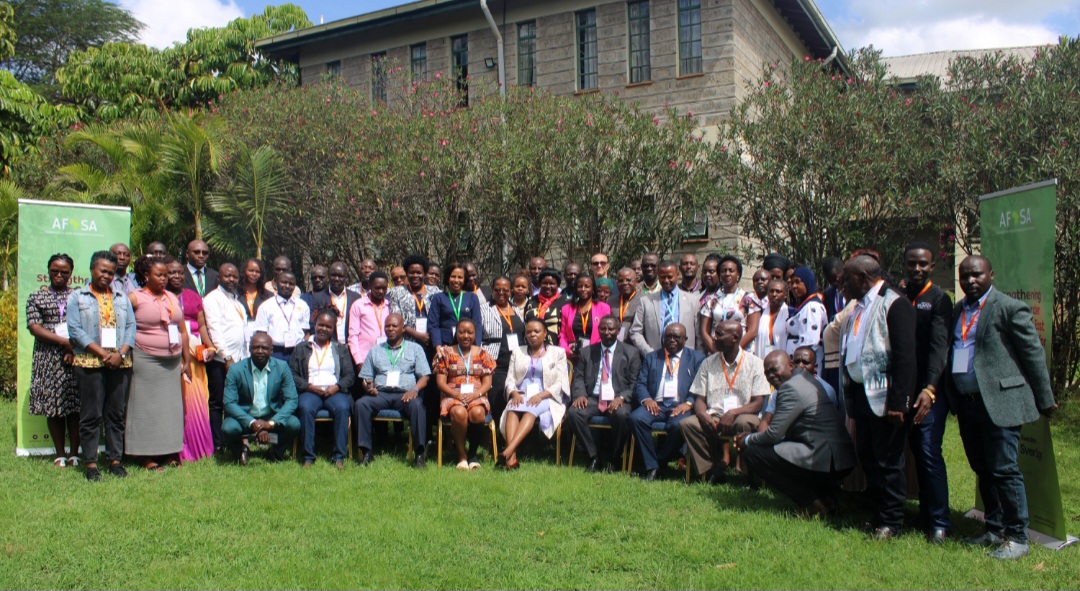Regional leaders across East Africa are facing renewed calls to urgently develop and implement bold policies that support agroecological traders and smallholder farmers. Experts warn that without structured support, the growing sector may struggle to reach its full potential.
This powerful appeal was made during a high-level summit on Strengthening Agroecological Produce Cross-Border Trade in the East African Region, held at Maanzoni Lodge, situated 41 kilometers from Nairobi, Kenya. The event, convened by the Alliance for Food Sovereignty in Africa (AFSA) and partners brought together experts, policymakers, and farmers from across the region to chart a path toward equitable and sustainable agroecological trade.
Experts emphasized that the trading of agroecological products—a sustainable farming model that promotes biodiversity, reduces dependency on chemical inputs, and preserves local knowledge—must be matched with deliberate, systemic government support at national, regional, and district levels.
“Governments across East Africa must be intentional,” urged Dr. Chaka Uzundu, a Sustainable Food Systems Researcher based in Ghana.
“They need to put in place mechanisms for soft loans, tax exemptions, and subsidies to support the production and distribution of organically grown products. If we can strengthen agricultural entrepreneurs producing organic fertilizers and pesticides, we will build an entire ecosystem that supports agroecological trade.”
John Wilson, the Lead at Citizens Group of AFSA and a smallholder farmer in Zimbabwe, reiterated the call for robust government backing. “There is need for subsidies on agroecological inputs like biofertilizers, seed banks, and farmer-managed seed systems,” he stated. “Without full government commitment, agroecology cannot truly take off.”
He highlighted the importance of investing in local infrastructure that supports the production and availability of these eco-friendly inputs, allowing farmers to become both producers and traders in a self-reinforcing green economy.
Bridget Mugambe the Programs Coordinator at AFSA highlighted agroecology’s wide-ranging benefits—spanning public health, food sovereignty, and environmental preservation.
“Agroecology is not just about food availability—it’s about improved livelihoods,” she said. “We must ensure our producers and traders access markets beyond national boundaries. This is how we build a prosperous and healthy society—through nutritious, culturally appropriate food, and the preservation of soil and animal health.”
Ayele Kabede, Senior Programs Manager at the Swedish International Development Agency (SIDA), added a powerful perspective on sovereignty and food security.
“Governments invest heavily in military forces, but food sovereignty begins when you can feed your people,” he said. “Africa doesn’t need to rely on imports when we have vast potential to grow our own food sustainably through agroecology.”
A Growing Trade Landscape
The summit also served as a platform to validate a new AFSA study showcasing the promising landscape of agroecological trade within the East African Community (EAC). The study surveyed four strategic border points—Busia (Kenya and Uganda), Mpondwe (DRC and Uganda), Namanga-Tarakea (Kenya and Tanzania), and Rusumo (Rwanda and Tanzania)—and found a flourishing movement of agroecological goods.
At Busia, beans are a key commodity, with 1,000.2 metric tons traded. Mpondwe emerged as a rice hub with a staggering 100,000.3 metric tons of rice moving through, alongside sorghum (35 tons) and groundnuts (34.6 tons). At Namanga-Tarakea and Rusumo, products like cassava (17.3 tons), bananas, cereals, legumes, and medicinal plants dominate the exchanges.
Particularly noteworthy are Rusumo’s cabbages and carrots, recording 146.9 metric tons and 92.6 metric tons, respectively—showcasing the variety and viability of agroecological farming in the region.
With compelling data and clear recommendations, the summit concluded with a unified call for East African governments to prioritize agroecology—not just as a farming practice, but as a transformational approach to food systems, environmental resilience, and economic empowerment.
Do you have a story in your community or an opinion to share with us: Email us at Submit an Article









